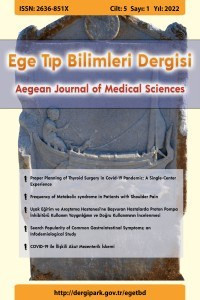DÜŞME ARENASI 2: DÜŞENİ KURTARABİLİR MİYİZ?
Ortopedi kliniklerinde en çok karşılaşılan problemlerden birisi olan kırıkların, yaşlı bireylerdeki en sık nedeni düşmelerdir. Düşmelere bağlı yaralanmaların en sık görülenleri de osteoporotik kalça, omurga ve ön kol kırıklarıdır. Bunlar arasında da en fazla sayıda ölümle sonuçlananları kalça kırıklarıdır. Kalça kırığı olan yaşlı bireyler en az bir yıl bakım gereksinimi duymakta ve çoğunluğunun sağlık kuruluşlarında kalma zorunluluğu olmaktadır. Bu durum da, yaşlıların uzun süre yatakta kalmaları sonucu dehidratasyon, pnömoni, idrar retansiyonu, dekübit yarası ve enfeksiyon gelişimi gibi eşlik eden problemlere sebep olmaktadır. Bu problemler de yaşlı bir hastada kırığın iyileşmesi süreci zarfında, hastanın morbidite ve mortalitesini arttıran faktörler olarak karşımıza çıkmaktadırlar.
Anahtar Kelimeler:
Düşme, yaşlı, ortopedi, kalça kırıkları
Fall arena 2: Can we save falling geriatric people?
One of the most common problems in orthopedics clinics are fractures, and the most common cause of these fractures in elderly people are falls. Osteoporotic hip, spine, and forearm fractures are the most common injuries due to falls. Among these, the highest number of deaths are related to hip fractures. Elderly individuals with hip fractures need at least one year of care, and most of them have to stay in health institutions.This condition also causes accompanying problems such as; dehydratation, pneumonia, urinary retention, decubitus wound and infection development as the elderly remain in bed for a long time. These problems are the factors that increase the morbidity and mortality of the patient during the healing process of the fracture in an elderly patient.
Keywords:
Fall, geriatric, orthopedics, hip fractures,
___
- 1. Zecevic AA, Salmoni AW, Speechley M, Vandervoort AA. Defining a fall and reasons for falling: comparisons among the views of seniors, health care providers, and the research literature.Gerontologist. 2006; 46(3): 367-376.2. Holtzer R, Friedman R, Lipton RB, Katz M, Xue W, Verghese J. The relationship between specific cognitive functions and falls in aging. Neuropsychology. 2007; 21(5): 540-548.3. Committee on Trauma Research, Commission on Life Sciences, National Research Council/Institute of Medicine. Injury in America. Washington, D.C.: National Academy Press, 1985.4. Sattin, R. W., and Nevitt, M. C. Injuries in later life: Epidemiology and environmental aspects. In: Oxford Textbook of Geriatric Medicine. New York: Oxford University Press5. Ebersole, P., Hess, P., Touhy, T.A., Jett, K., Luggen, A.S. (2008). Toward Healthy Aging. Missouri, Mosby.6. Cooper C, Melton LJ 3rd. Magnitude and impact of osteoporosis and fractures. In: Marcus R, Feldman D, Kelsey J, eds. Osteoporosis. San Diego: Academic Press, 1996:419-434. 7. Savaş, S., Akçiçek, F. (2010). Kapsamlı geriatrik değerlendirme. Ege Tıp Dergisi. 49(3) Ek / Supplement: 19-30.8. Casaletto JA, Gatt R. Post-operative mortality related to waiting time for hip fracture surgery. Injury. 2004 Feb;35(2):114-20.9.Dorotka R, Schoechtner H, Buchinger W. Theinfluence of immediate surgical treatment of proximal femoral fractures on mortality and quality of life. Operation within six hours of the fracture versus later than six hours. J Bone Joint Surg Br. 2003 Nov;85(8):1107-13.10. Rogmark C, Carlsson A, Johnell O, Sernbo I. A prospective randomised trial of internal fixation versus arthroplasty for displaced fractures of the neck of the femur. Functional outcome for 450 patients at two years. J Bone Joint Surg Br. 2002 Mar;84(2):183-8.11. Törnkvist H, Hearn TC, Schatzker J. The strength of plate fixation in relation to the number and spacing of bone screws. J Orthop Trauma. 1996;10(3):204-8.12. Rao RD, Singrakhia MD. Painful osteoporotic vertebral fracture. Pathogenesis, evaluation, and roles of vertebroplasty and kyphoplasty in its management. J Bone Joint Surg Am. 2003 Oct;85-A(10):2010-22. Review.
- ISSN: 2636-851X
- Yayın Aralığı: Yılda 3 Sayı
- Başlangıç: 2018
- Yayıncı: Uşak Cerrahi Derneği
Sayıdaki Diğer Makaleler
YAŞLILARDA DÜŞME, ÖNEMİ ve RİSK FAKTÖRLERİNİN DEĞERLENDİRİLMESİ
YAŞLILARDA ÇOKLU İLAÇ KULLANIMI VE DÜŞMELER
DÜŞME SEBEBİ OLARAK VERTİGO VE TEDAVİSİ
DÜŞMEYE HEMŞİRE BAKIŞI VE DEĞERLENDİRİLMESİ
DÜŞMEDE ÇEVRESEL FAKTÖRLERİN DEĞERLENDİRİLMESİ
KIRIK SONRASI BAKIM VE REHABİLİTASYONU
Firuzan FIRAT ÖZER, Sibel AKIN
